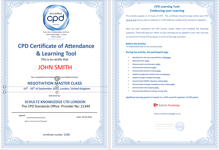
Effective Negotiation Course in London 27-28 June 2024
How to Get What You Want: Negotiation Strategies That Work
Schultz Knowledge
Summary
- Certificat of Attendance - Free
Add to basket or enquire
Location & dates
End date: 28/06/2024
Additional info: 9 AM till 12:30 pm
60, Pentonville Road
North London
London
N19LA
United Kingdom
Overview
Introduction to Negotiations
Experience conflict and explore the basics of negotiation,
Core Negotiations Strategy
Dive deeper into core negotiation concepts to identify strategies and principles that can be applied to achieve different outcomes.
Distributive Bargaining: Key Concepts
Explore how to claim value in negotiations, understand the difference between BATNA (Best Alternative to a Negotiated Agreement) and reservation price, pinpoint common errors, and anticipate three kinds of “no.”
ZOPA (Zone of Possible Agreement), WAP (Walk Away Point), RV (Reservation Value), AR (Aspiration Value), MESO (Multiple Equivalent Simultaneous Offer), Influencing and Claiming Value
Discover the principles of influence, the use of anchoring and value claiming, the function of focal points, and the ethical implications of negotiating,
Key Phases of Negotiation
Recognising and Managing the Key Phases / Preparation / Opening / Debating / Moving / Agreeing / Reviewing.
Preparing For a Negotiation
Negotiation Preparation Worksheet / Treatment of Numerical Data / Identifying Strengths and Weaknesses / Defining Variables / Setting Objectives / Identifying and Using Concessions / Strategy.
The Negotiator's Dilemma:
Personal Signatures and Pre-Negotiating Strategy
Analyze your own personality traits, target the best negotiation approach, and prepare to bargain using the strategies
Psychological and Strategic Barriers
Focusing on difficult tactics in negotiations, you will create a plan to overcome them, including concepts such as the circle of value and reframing.
Negotiation tactics
Certificates
Certificat of Attendance
Hard copy certificate - Included
The graduates will receive 15 credits CPD Certificate of Attendance in Effective negotiation.
CPD
Course media
Description
Having strong negotiation skills is crucial for resolving conflicts, creating win-win situations, and achieving mutually beneficial outcomes in both personal and professional relationships. Negotiation skills allow you to advocate for your needs and interests while finding solutions that work for everyone involved.
There are several key concepts important to understand when it comes to effective negotiation:
- Positions vs Interests - Focusing on underlying interests rather than superficial positions creates more flexibility and opportunities to meet both sides' real needs.
- BATNA (Best Alternative to a Negotiated Agreement) - Knowing your walkaway point if negotiations fail means you can push for the best possible deal without accepting a bad one.
- Objective criteria - Basing proposals on facts/data rather than emotions or ego makes it easier to reach equitable solutions.
Proper negotiation preparation sets you up for success at the bargaining table. There are several key steps to keep in mind:
Mastering these negotiation techniques allows you to achieve win-win outcomes, secure mutually beneficial agreements, and resolve conflicts effectively. Strong negotiation skills are essential for personal, professional, and business success.
Before sitting down to negotiate, determine the range of possible outcomes that would be acceptable to you. This is your bargaining zone. Your initial offer should be at the high end of this zone, while your "walkaway" point marks the low end. Knowing your bargaining zone helps you establish realistic targets.
Negotiation often involves each party making offers and counteroffers until a mutually agreeable deal is reached. When bargaining, it's important to employ certain tactics to get the best possible outcome.
Learn to spot common bargaining tactics to prevent manipulation. For example, bogus trades, false demands, escalating demands, and doubletalk. Remain savvy to such approaches. Don't get distracted or lured by side issues. Focus on your interests and try to determine if the other party has valid motivations behind their tactics or is merely posturing.
High-pressure tactics aim to stress you into accepting terms. Expect time-limited offers, personal insults, threats to walk away, and frequently escalating demands. Stay calm and collected. Reveal little information about emotions or limits. Seek evidence to justify demands. Assert your positions confidently. Be prepared to walk away rather than accept a bad deal. With practice, you can respond effectively to pressure.
Reaching a successful conclusion to a negotiation requires recognizing when the time is right to close the deal. Watch for signals that indicate your negotiating partner is ready to finalize an agreement. Examples include summing up points of agreement, offering concessions, or asking clarifying questions about implementation.
Who is this course for?
Any person interested in the subject.
Requirements
- Applicants are expected to have a good command of both written and spoken English
Career path
Master the art of negotiation - improve your career and life!
Questions and answers
Currently there are no Q&As for this course. Be the first to ask a question.
Reviews
Currently there are no reviews for this course. Be the first to leave a review.
Legal information
This course is advertised on reed.co.uk by the Course Provider, whose terms and conditions apply. Purchases are made directly from the Course Provider, and as such, content and materials are supplied by the Course Provider directly. Reed is acting as agent and not reseller in relation to this course. Reed's only responsibility is to facilitate your payment for the course. It is your responsibility to review and agree to the Course Provider's terms and conditions and satisfy yourself as to the suitability of the course you intend to purchase. Reed will not have any responsibility for the content of the course and/or associated materials.



